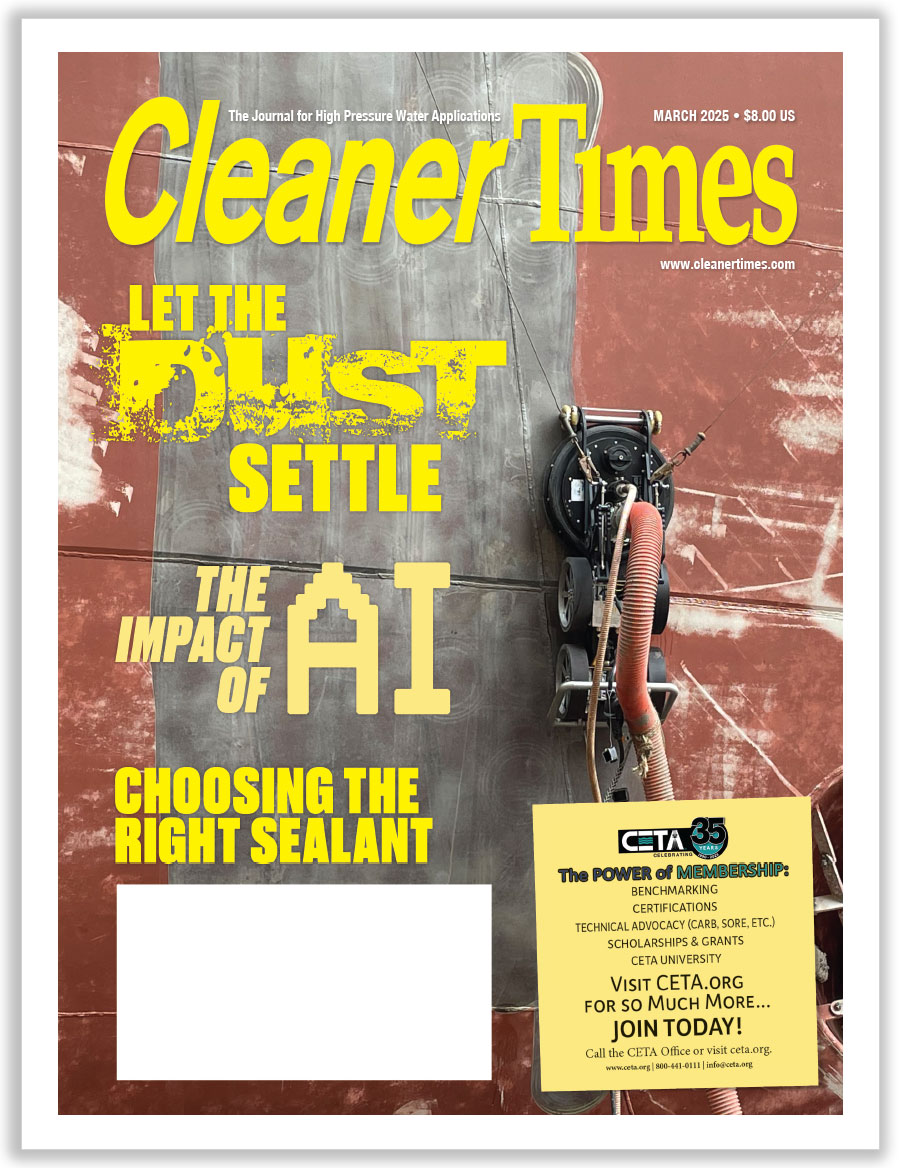
The History of Pressure Washing: Evolution of an Industry, Part Seven: Growing Together: How Consolidation Is Changing Our Industry
Published September 2014

This is the seventh in a multi-part series that traces the history of the pressure washing industry from the mid-1970s to present day. An 18-part history series, that covered the early history, was first published in Cleaner Times beginning in February 1996 and reprinted beginning in March 2007. Those interested in reading the early industry history, or who may have missed the first installments of this new series, may view them online at: http://cleanertimes.com/artgrp.cfm?fpid=82.
The dictionary defines consolidation as the combining of assets, equity, liabilities, and operating accounts of a parent firm in a merger or ownership transfer to form a new, larger firm. From a layman’s point-of view, consolidation simply means that times are changing. While the pressure washing industry may have started out with the vast majority of our equipment manufacturers, distributors, and service providers being family-owned small operations, this is no longer the case. Consolidation is an epidemic that is sweeping the nation in all industry sectors and taking pressure washing right along with it.
“Industry consolidation appears to be more prevalent in other parts of the country than it has been in our region,” reports Dennis Black, McHenry Pressure Cleaning Systems, Frederick, MD. “That being said, I think it is more and more difficult for smaller, grassroots distributors (dealers) to survive. Sadly, our changing marketplace has consumed a lot of businesses. The trend will probably continue in the long term. Profit margins on equipment have slimmed and, if you don’t expand and develop areas of specialty, rather than depending on the same cookie-cutter products, survival will be tough for all of us. Some companies are continuing to make a living now, but I believe that their futures are limited, and some may not even be attractive as potential buyouts.
“I feel that another major factor that is driving the trend to consolidation is how the relationship between manufacturers and distributors has changed,” adds Black. “The proverbial ‘writing on the wall’ illustrates the importance of distributors and manufacturers defining or even redefining their relationships. Some manufacturers appear not to value what the distributor brings to the relationship as much as they did in the past. Internet-based and non-brick-and-mortar type businesses have a major cost advantage. This alienates the distributor, putting them at a disadvantage. It has been evolving over the past 10 years or so, and indications are that it will continue. After stating all this gloom and doom, I do believe the professional distributor of the future can survive by defining and finding their place in the market.”
Tim Layden, CEO at High PSI, Chicago, IL, agrees that, in another five to 10 years, the majority of pressure washing equipment distributorships will be owned by fewer and fewer small Limited Liability Corporations (LLCs). He points to ever-increasing regulations and legislation, as well as advances in technology, as the driving force.
“The big companies will be the only ones able to afford all of the certifications as the industry becomes more specialized,” remarks Layden. “It is not as it was 30 years ago, when you just dropped off the machine to the client. Today’s customers want and need training videos and on-site instruction relating to safety and equipment operations. Year after year, I see a consolidation of the industry, with the big dealers getting larger because they have the money and the wherewithal to train and move forward faster.”
BE Pressure & Supply, Abbotsford, British Columbia, Canada, is another example of a company that has successfully grown through consolidation explains President Curtis Braber. The company started by his father more than three decades ago now has seven distribution centers in Canada and the USA, as well as a relatively new acquisition in Australia.
“In the 1990s, we expanded from Canada to the USA by purchasing Sprak Pressure Washers in Florida,” explains Braber. “We rebranded that company as BE. Recently, we achieved global penetration with the purchase of the BAR Group, a manufacturer of industrial pressure washers in Australia. We do not plan to rebrand this company because it is a well-established brand. Rebranding might lead to confusion.”
When discussing the effects of consolidation on our industry, however, Braber switches hats from being the head of his own company to his role as Vice President of the Cleaning Equipment Trade Association (CETA). The staging of the association’s annual convention and trade show has been affected by industry consolidation. Braber believes that will turn out to be a good thing.
“In previous years, CETA’s convention and ISSA’s Interclean trade shows ran concurrently; one in October and the other in November. Many of the exhibitors and delegates had to decide which of the two they would attend, or absorb the cost of attending both. This year, CETA is foregoing their annual trade show and, instead, partnering with ISSA (the International Sanitary Supply Association) in one larger event to be held November 4–7 in Orlando, FL. Both organizations are within the larger umbrella of the cleaning industry and to stage the events together just made sense. CETA’s board recognized that ISSA brings a lot to the table, in terms of a large venue, excellent speakers, and more. That, combined with the fact that consolidation of many of the smaller manufacturers and distributors into larger corporations has decreased the number of individual trade show exhibitors, resulting in ‘stand-alone’ trade shows becoming smaller and smaller. So, CETA’s annual event is now branded as ‘CETA’s Annual Convention at ISSA InterClean.’ This consolidation will result in a better return on investment for delegates and exhibitors. There will be a larger trade show, providing a chance to view products and services they might otherwise not have seen. Plus, there will be expanded opportunities for motivational input, networking, and education, with a better return on investment.”
Another point-of-view comes from Marlo Dean, Kärcher North America, Englewood, CO. With more than 35 years of industry experience, Dean has worked through the consolidation evolution. He experienced many of the acquisitions firsthand.
“I started working for LANDA part-time while going to school to obtain my doctorate degree,” recalls Dean. “I joined LANDA full-time in 1980, until it was sold in 1999. I then worked for C-Tech Industries that was formed by the acquisition of several companies including Hotsy, Tuff, Rhino Industries, LANDA SprayMart’s, Cuda, Shark, Water-Maze, Leuco Pump, and several other associated companies. In about 2005, Alfred Kärcher GmbH, of Germany, purchased C-Tech Industries. Shortly thereafter, Kärcher purchased Windsor, Prochem, TecServ, Century 400, and Graco. These five floor care companies complimented the rest of our product offerings for the cleaning equipment industry.”
Dean adds that while many of the C-Tech’s, Kärcher’s, and other corporate acquisitions happened in the late 1990s and 2000s, consolidation was starting to happen as far back as the 1970s. Hotsy, for example, was started by Bob Cohen in 1970, after he purchased Kanco Tech and Slifer Manufacturing. The Kärcher’s history goes back even further. Alfred Kärcher, an entrepreneur and inventor who focused mainly on heating technology, developed the first European hot water pressure washer in 1950—the KW 350. This invention marked the Kärcher Company’s entry into the cleaning equipment market, a market in which it is still a world leader. There were cold water high pressure cleaner manufacturers and steam cleaners, but the idea of using hot water high pressure to clean dirty surfaces was a new idea that launched this very successful company. After his death in 1959, his wife, Irene Kärcher, managed the company until her death in 1989. Over the next 25 years, the company branched out mainly through acquisitions.
With increased size often comes increased profitability. Across North America and around the world, communities are benefiting from the generosity of corporations with a conscience.
“Kärcher, for example, has a disciplined culture that honors the founders’ name with how they conduct their business and treat their employees,” explains Dean. “They provide free services worldwide to promote the pressure washing industry by cleaning landmarks such as the Statue of Liberty, the Space Needle, and Mount Rushmore, plus other well-known landmarks outside the U.S., including the Statue of Christ in Rio de Janeiro. This type of community involvement is expensive but provides exposure to the possibilities of the pressure washing industry applications. Kärcher also donates millions around the world helping countries and communities devastated by natural disasters. They have donated water treatment and purifications systems to countries, helping people in need of safe drinking water to survive. This type of involvement has helped our industry to become more than just a pressure washer industry.”
Consolidation is not the only factor that will come into play as our industry moves into the future. Dean believes that we need to develop a new, more efficient technology for heating water that produces low emissions to comply with EPA standards.
“I see this industry evolving at the present growth rate and, as the world market expands, the need for cleaning equipment will expand,” concludes Dean. “However, the foreign competition from China and other countries will place strong pressures to compete on our North American pressure washer manufacturers. Because of the simplicity of design and manufacturing the cold water pressure washer market has made it easy for companies to enter this market. This drives down pricing and makes it very difficult for North American manufacturers to survive on low profit margins, making consolidation one of the ways we can continue to compete.”
Next Month: We will be featuring Industry Collaboration: Formation of Professional Associations. If you have any pressure washing stories, memories, or photos from 1980 through 2014 that you would like to share with Cleaner Times|IWA readers, please e-mail them to terriperrinwriter@gmail.com.




